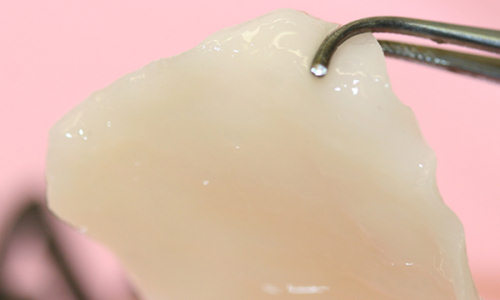Scientists at the University of Basel report first ever successful nose reconstruction surgery using cartilage grown in the laboratory. Cartilage cells were extracted from the patient’s nasal septum, multiplied and expanded onto a collagen membrane. The so-called engineered cartilage was then shaped according to the defect and implanted. The results will be published in the current edition of the academic journal “The Lancet”.
Made from a probe of the nasal septum: white, glossy cartilage made in the laboratory (Figure: Department of Biomedicine at the University of Basel).
A research team from the University of Basel in Switzerland has reported that nasal reconstruction using engineered cartilage is possible. They used a method called tissue engineering where cartilage is grown from patients’ own cells. This new technique was applied on five patients, aged 76 to 88 years, with severe defects on their nose after skin cancer surgery. One year after the reconstruction, all five patients were satisfied with their ability to breathe as well as with the cosmetic appearance of their nose. None of them reported any side effects.
Cells from the nasal septum
The type of non-melanoma skin cancer investigated in this study is most common on the nose, specifically the alar wing of the nose, because of its cumulative exposure to sunlight. To remove the tumor completely, surgeons often have to cut away parts of cartilage as well. Usually, grafts for reconstruction are taken from the nasal septum, the ear or the ribs and used to functionally reconstruct the nose. However, this procedure is very invasive, painful and can, due to the additional surgery, lead to complications at the site of the excision.
Together with colleagues from the University Hospital, the research team from the Department of Biomedicine at the University of Basel has now developed an alternative approach using engineered cartilage tissue grown from cells of the patients’ nasal septum. They extracted a small biopsy, isolated the cartilage cells (chondrocytes) and multiplied them. The expanded cells were seeded onto a collagen membrane and cultured for two additional weeks, generating cartilage 40 times the size of the original biopsy. The engineered grafts were then shaped according to the defect on the nostril and implanted.
New possibilities for facial reconstruction
According to Ivan Martin, Professor for Tissue Engineering at the Department of Biomedicine at the University and University Hospital of Basel, “The engineered cartilage had clinical results comparable to the current standard surgery. This new technique could help the body to accept the new tissue better and to improve the stability and functionality of the nostril. Our success is based on the long-standing, effective integration in Basel between our experimental group at the Department of Biomedicine and the surgical disciplines at the University Hospital. The method opens the way to using engineered cartilage for more challenging reconstructions in facial surgery such as the complete nose, eyelid or ear.”
The same engineered grafts are currently being tested in a parallel study for articular cartilage repair in the knee. Despite the optimistic perspectives, the use of these procedures in the clinical practice is still rather distant. “We need rigorous assessment of efficacy on larger cohorts of patients and the development of business models and manufacturing paradigms that will guarantee cost-effectiveness”, says Martin.
Story Source:
The above story is based on materials provided by University of Basel.





